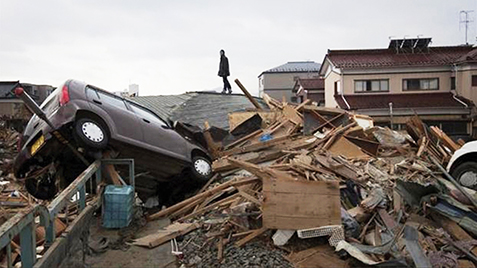

/ Published November 6, 2013
In responding to major disasters—locally, nationally and internationally—I work with people experiencing the most profound suffering and a labyrinth of losses. Their loved ones may have been taken away or tortured by soldiers; often they have lost everything. But I am always stunned and inspired by the strength and resiliency I witness.
More often than not, gratitude is at the core of this fortitude; gratitude is what can shift a tragic narrative to one of thankfulness and hope. A man with whom I worked in Haiti had experienced intense, destabilizing trauma after the 2010 earthquake killed his fiancée. Years later, he still writes to me expressing his gratitude at having survived. He explains that his family, friends and community came together to “hold” him as he grieved, cried and mourned his way to a reconstructed life and a resurrected sense of meaning. Today he honors and carries the memory of his fiancée forward through his work in social services helping other people. Similarly, psychiatrist, author and Holocaust-survivor Victor Frankl transmuted his unimaginable suffering in a Nazi death camp to explore the inextinguishable search for meaning that informed his life and still informs the many lives he has touched through his books.

Joshua Miller
We do not only apprehend gratitude cognitively, we feel a sense of gratitude. And gratitude has a social dimension—we often direct a sense of gratitude toward others or act in a way that inspires others to be grateful toward us. For some, gratitude holds a spiritual aspect—connecting an individual to a larger belief system outside one’s personal troubles. Gratitude is transformative—it takes us outside of our own sorrows and dilemmas, giving us the capacity to convert anger, resentment and sorrow into faith and optimism.
Although a sense of gratitude is subjective, it engenders physiological changes as well. Meditators focusing on compassion (which is closely linked to gratitude) have shifts in brain activity as sites of fear and anxiety diminish and those fostering feelings of empathy, compassion and the desire to help others light up. Brainwave patterns shift, leading to a greater sense of wellbeing. The body secretes hormones, such as oxytocin which is associated with partners and deep friendships.
Gratitude is not a panacea—it does not automatically lead to social justice, healthy workplaces or enhanced self-esteem. But it is alchemic; a force uniting the relational, social and historical with heart, mind and spirit—in a way that is gentle, forgiving and affirming of humankind’s highest aspirations.
Joshua Miller is a professor and associate dean and of the Smith College School for Social Work.















